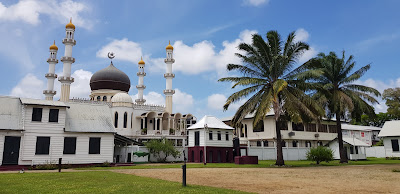
As Alfred would like to say, don’t arrive late at the party if you want more of that alcohol. Since the Brits, the French, and the Dutch arrived at the South America party a bit later, they found out that the Spaniards and the Portuguese already divided the tequila pie between the two of them. All that was left was a small coastal chunk north of Brazeeew and east of what Filipinos love calling Valenzuela at Miss Universe. And so begins the story of the three Guianas and how they ended up speaking three different European languages.
The one to the left right next to Venezuela went to the British empire and was referred to as British Guiana for most of its colonial history. Post-independence, it dropped the British prefix and changed the -i to -y. Let’s refer to it as Plain Guyana. Not sugar-free, perhaps, like regular Coke. The Dutch-flavored neighbor in the middle got rid of the whole Guiana moniker altogether and baptized itself as Suriname. The last Guyana to the right is the only one not to gain independence. No name change, it remains an overseas territory of France up to this day. (British) Gu(i)yana. Dutch Guiana > Suriname. French Guyana.



This also means that visa requirements differ among the three. French Guyana requires a Schengen visa, being part of France. Guyana usually gives visa-on-arrival which means having to bring application documents and passport photos with you. Only Suriname is visa free for Philippine passport holders. With one look at my passport, the immigration officer gave me the 30 days as I waltzed down the baggage claim area. Adolf Pengel International Airport is in Zanderij, and the car/taxi ride to the capital will take you an entire hour. And that’s how I ended up here in Paramaribo, or Par’bo for short.



What? They have flights to and from Miami, meaning this was a good pitstop so I could go back to ‘MERICA! If the country was that isolated, I wouldn’t even bother. But here we are. I’ve never been to an ex-Dutch colony before, which is a blatant lie because I’ve already been to Indonesia several times. It’s just that I didn’t find a lot of colonial traces there other than the obvious linguistic influences. As for Paramaribo, the people here still speak Dutch as a majority language, and you are still bound to find preserved colonial buildings dating back to the Dutch occupation way back.

Unlike their Spanish counterparts who preferred pastel colors, it seems that the Portuguese and the Dutch were in agreement when it came to architectural façades. What you get is a predominantly white surface accentuated with solid colors via the doors and windows. I guess the difference between the Dutch and the Portuguese is that the former seemed to prefer the predominance of wooden planks, making you imagine as though the houses’ external walls had been plastered one by one on top of the other, as opposed to the Portuguese colonial house that looks like one solid concrete whole.

And then you have the balustrades bordering the upper floors, making up a terrace overlooking the road down below. Since my hotel is located quite within walking distance of the historic inner city, an afternoon stroll was all it took for me to see the touristic core. Once you reach Palmentiun along the riverbanks, you only have to take note of the flags along the main road as a marker that you have reached the presidential palace. Walk along that street in front of it and you will eventually end up at the minor basilica and the historical houses currently being renovated by the local government.

You don’t need an itinerary for that. Just get lost there and stumble upon random attractions that can be of interest such as a synagogue and a mosque right next to each other. Par’bo is rumored to have some more places of worship for different religions, but they are farther away. You might need a taxi ride. Since there is no Uber here and I refuse to withdraw cash, I am already contented with what I can see as far as my feet would take me.

Overall, I was amused with what I saw as well as what I heard in the streets. It just makes me want to take up Dutch again which I already abandoned long ago. At least now I know there are other options for language immersion aside from Belgium and the Netherlands! I’ll probably come back to Suriname in the future to make it a base for exploring the other two Guyanas. For now, I’m already satisfied with what I saw considering I’m only here for extended transit. Dank je wel, Par’bo. Tot ziens!










0 creature(s) gave a damn:
Post a Comment